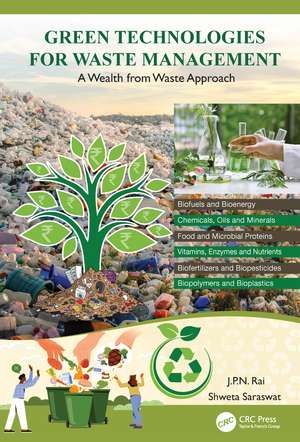Green Technologies for Waste Management: A Wealth from Waste Approach
Autor J.P.N. Rai, Shweta Saraswaten Limba Engleză Hardback – 5 sep 2023
FEATURES
- Provides a comprehensive, state-of-the-art coverage of waste management practices, their challenges, and solutions from a global perspective
- Discusses conceptual principles and practices of various green technologies that can be used to generate valuable products from waste and improve environmental quality
- Includes case studies from the United States and Japan, providing detailed explanations of advanced bioremediation technologies
- Takes a holistic approach to waste management and bioproducts recovery
- Offers an easy-to-understand and target-oriented approach that helps both students and professionals advance their knowledge in creating wealth from waste
Preț: 798.37 lei
Preț vechi: 973.62 lei
-18% Nou
Puncte Express: 1198
Preț estimativ în valută:
152.79€ • 158.92$ • 126.13£
152.79€ • 158.92$ • 126.13£
Carte tipărită la comandă
Livrare economică 14-28 aprilie
Preluare comenzi: 021 569.72.76
Specificații
ISBN-13: 9781032230818
ISBN-10: 1032230819
Pagini: 405
Ilustrații: 25 Tables, black and white; 44 Line drawings, color; 9 Line drawings, black and white; 1 Halftones, black and white; 44 Illustrations, color; 10 Illustrations, black and white
Dimensiuni: 178 x 254 x 24 mm
Greutate: 0.91 kg
Ediția:1
Editura: CRC Press
Colecția CRC Press
ISBN-10: 1032230819
Pagini: 405
Ilustrații: 25 Tables, black and white; 44 Line drawings, color; 9 Line drawings, black and white; 1 Halftones, black and white; 44 Illustrations, color; 10 Illustrations, black and white
Dimensiuni: 178 x 254 x 24 mm
Greutate: 0.91 kg
Ediția:1
Editura: CRC Press
Colecția CRC Press
Public țintă
Postgraduate, Professional, and Undergraduate AdvancedCuprins
Part I: Environmental Wastes: Status, Prospects, and Management. 1. Waste: Classification, Generation, and Status. 2. Waste as a Resource. 3. Life Cycle Assessment of Waste Management Systems. Part II: Green Technologies for Wealth Generation. 4. Bioremediation. 5. Biodegradation. 6. Biosorption Technology. 7. Single-Cell Protein Technology. 8. Bioenergy Production Technologies. 9. Nanobiotechnology: Concept and Scope for Wealth Generation. 10. Hydrometallurgy and Biomining. 11. Constructed Wetlands and Microcosm Technology. Part III: Holistic Approach for Waste Management and Bioproducts Recovery. 12. Principles and Practices for Zero Waste Concept. 13. Technology Integration for Zero Waste Production. 14. Recovery of Byproducts and Other Value-Added Products from Waste.
Notă biografică
J.P.N. Rai, PhD, is presently working as a full-time professor in the Department of Environmental Sciences, at G.B. Pant University of Agriculture and Technology, Pantnagar, Uttarakhand, India, and has been the Head of the Department for eight years. Dr. Rai has supervised more than 25 PhD theses and teaches postgraduate and PhD courses titled Biodegradation and Recycling of Wastes, Waste Treatment Design, and Environmental Waste Utilization. He has published two books along with more than 200 publications to his credit, including research papers, review articles, and chapters in scientific journals of national and international repute, apart from being a versatile reviewer of several journals. He has over 37 years of teaching and research experience in the field of environmental science, particularly in environmental biotechnology. He has successfully completed a dozen research projects in various fields of ecotechnology, bioenergy production, bioremediation of wastewater and terrestrial sites, as well as nanobiomaterial synthesis and their applications in addressing environmental issues. Currently, he is actively engaged in the research of environmental waste degradation and its utilization, wastewater treatment, and purification, employing a diverse nature of bioresources.
Shweta Saraswat, PhD, is an assistant professor in the Department of Environmental Sciences at G.B. Pant University of Agriculture and Technology, Pantnagar, Uttarakhand, India. She is also a former postdoctoral fellow in various projects funded by the Department of Science and Technology, Indian Council of Medical Research and Ministry of Environment, Forest and Climate Change, and the Government of India. She has 13 years of research and teaching experience to her credit. Her previously published works include a book, more than 15 research papers, including review articles and book chapters in reputed scientfic peer-reviewed journals in the field of bioremediation of terrestrial and aquatic systems, bioenergy production, green technology development for environmental waste reduction and their effective utilization. She is now working on integrating nanotechnology with bio-based systems for sensing, analyzing, and treating the contaminated wastewater in an efficient and sustainable manner.
Shweta Saraswat, PhD, is an assistant professor in the Department of Environmental Sciences at G.B. Pant University of Agriculture and Technology, Pantnagar, Uttarakhand, India. She is also a former postdoctoral fellow in various projects funded by the Department of Science and Technology, Indian Council of Medical Research and Ministry of Environment, Forest and Climate Change, and the Government of India. She has 13 years of research and teaching experience to her credit. Her previously published works include a book, more than 15 research papers, including review articles and book chapters in reputed scientfic peer-reviewed journals in the field of bioremediation of terrestrial and aquatic systems, bioenergy production, green technology development for environmental waste reduction and their effective utilization. She is now working on integrating nanotechnology with bio-based systems for sensing, analyzing, and treating the contaminated wastewater in an efficient and sustainable manner.
Descriere
This book addresses various types of wastes, their generations, and the status of waste management in developed and developing countries. It discusses advanced green technologies used in harnessing energy and bioproducts from waste, highlighting how these innovative tools do not damage the environment but are rather an alternate source of energy.
